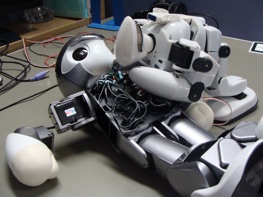UNDER CONSTRUCTION (some movies to watch)
Keywords:
■ Natural Language Processing:
Inductive Learning,Machine Translation,Voice To Voice Translation,Dialog Processing,Morphological Analysis,Dependency Parsing,Japanese Input Methods,Discourse Control,Voice Dialog Systems,Communication With Animals,Language Acquisition for Machines
■ Acoustic Processing:
Multimodal Dialog Systems,Talking Car Navigation Systems,Error Recognition,Voice Information Processing with Pretending Abilities,Dialog Analysis,Parallel Dialog Processing,User Satisfaction,Emotions,User Modeling
■ Common Sense and Affective Processing:
Common Sense Knowledge Retrieval、Affective Information Web-Mining、Affect Recognition, Context Processing, Categorization, Exception Processing, Unlimited Dialog Systems and Question Answering, Machine Ethics, Embodied and Virtual Cognitive Architectures, Turing Test, Emotional Intelligence, Social Intelligence





■ Natural Language Processing (Prof. Araki)
Babies learn languages while growing up and we aim at modeling such process. We use inductive learning which discovers various rules hidden in a given language.
The same method is utilized for machine translation technologies.
We also are interested in the problem of mutual understanding between human and a machine - again, by developing a system learning from a conversation by using induction.
Japanese Input Method for Mobile Devices is another research topic where this method is utilized.


■ Spoken Language Processing (Prof. Itoh)
Spoken language is the basic method of human communication and is the most desired type of human-machine interface. It is especially useful when one cognitive task (like driving a car) is being undertaken and we need to involve completing another task (like manipulating a car navigation system) at the same time.
In our lab we aim at a high performance voice recognition and generation system that can be robust to recognition errors.


-
-spoken language understanding system using recognizer trust measurements, situation and context data.
-
-dialog control method for high user satisfaction
-
-multimodal dialog system changing according to changing user preferences and usage situations
- analysis of language and sound characteristics during parallel cognitive tasks.
■Common Sense Knowledge Acquisition and Affective Processing (Prof. Rzepka)
In order to develop satisfying natural language processing systems, a machine needs to know the world and human behaviors. We use vast textual sources as Internet to acquire such knowledge and test it in various dialog systems. We treat common sense and emotions as basic ingredients for developing more sophisticated intelligent agents that can be empathic, behave morally or be funny.


-
-emphatic machines (emotional consequences and reasons retrieval, etc.)
-
-moral machines (moral and social consequences and reasons retrieval, etc.)
-
-common sense knowledge (context dependency processing, ConceptNet-JP, etc.)
-
-social computing (robot’s task priority calculations, humanoid gestures, emoticons understanding and generating, etc.)





